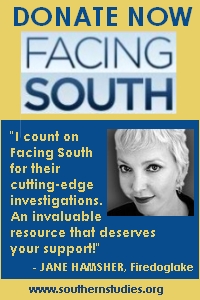"My husband would be alive today if we read a report like yours"
 Earlier this month, you may have read a story I wrote for Facing South about how a federal agency charged with protecting our environmental health had misled the public about dangers from poisoned drinking water at a Marine Base in North Carolina.
Earlier this month, you may have read a story I wrote for Facing South about how a federal agency charged with protecting our environmental health had misled the public about dangers from poisoned drinking water at a Marine Base in North Carolina.A number of you wrote to me, called or left comments. The one that hit me the hardest came from reader Jody MacPherson, who wrote:
Thank you so much for your reporting these facts. My husband Colin would be alive today had we read a report like yours. The exposure [to] these chemicals has hit my family hard, losing my husband and father-in-law within months of each other. The recent news keeps me optimistic that the work will finish soon and we can bury my husband for his "Service Connected Illness" which as of today, has been denied to us."My husband ... would be alive today had we read a report like yours."
That, dear readers, is why I do what I do. And that's why I'm asking you to support the Institute Investigative Fund today.
Working for a scrappy little nonprofit journalism outfit like the Institute for Southern Studies is not a path to fortune. But I don't do what I do for the money -- I do it because I believe in nonprofit journalism as a tool for making an impact in people's lives. I can bring to light crucial information that other media are reluctant to publish, fearing the potential backlash from advertisers or other powerful interests.
My recent story on the legacy of the 1979 Three Mile Island nuclear disaster is another example.
When I first heard about Randall and Joy Thompson, two people hired to monitor radiation at the plant after the meltdown -- and who say the official version of what happened is flat-out wrong -- I was skeptical. But I was also curious and wanted to learn more.
Editors in the corporate press likely wouldn't have given the story a chance. And in fact, reporters at big daily papers had tried to bring the Thompsons' story to light before -- only to have it killed by higher-ups.
But here at Facing South and the Institute, my co-workers encouraged me to keep digging. My reporting led to one of the most widely-read pieces ever for Facing South -- a story that's helped thousands understand better what happened 30 years ago, and what it means for our safety in the future.
There are lots of fearless journalists out there. But there are not many fearless publishers, which is why the Institute for Southern Studies and Facing South are so important. Without brave media sources that value truth over profit and are willing to take risks, stories like these -- life-saving stories -- would not get told.
So please help insure a future for fearless journalism: Please support the Institute for Southern Studies and Facing South by making a tax-deductible contribution today.
Tags
Sue Sturgis
Sue is the former editorial director of Facing South and the Institute for Southern Studies.
